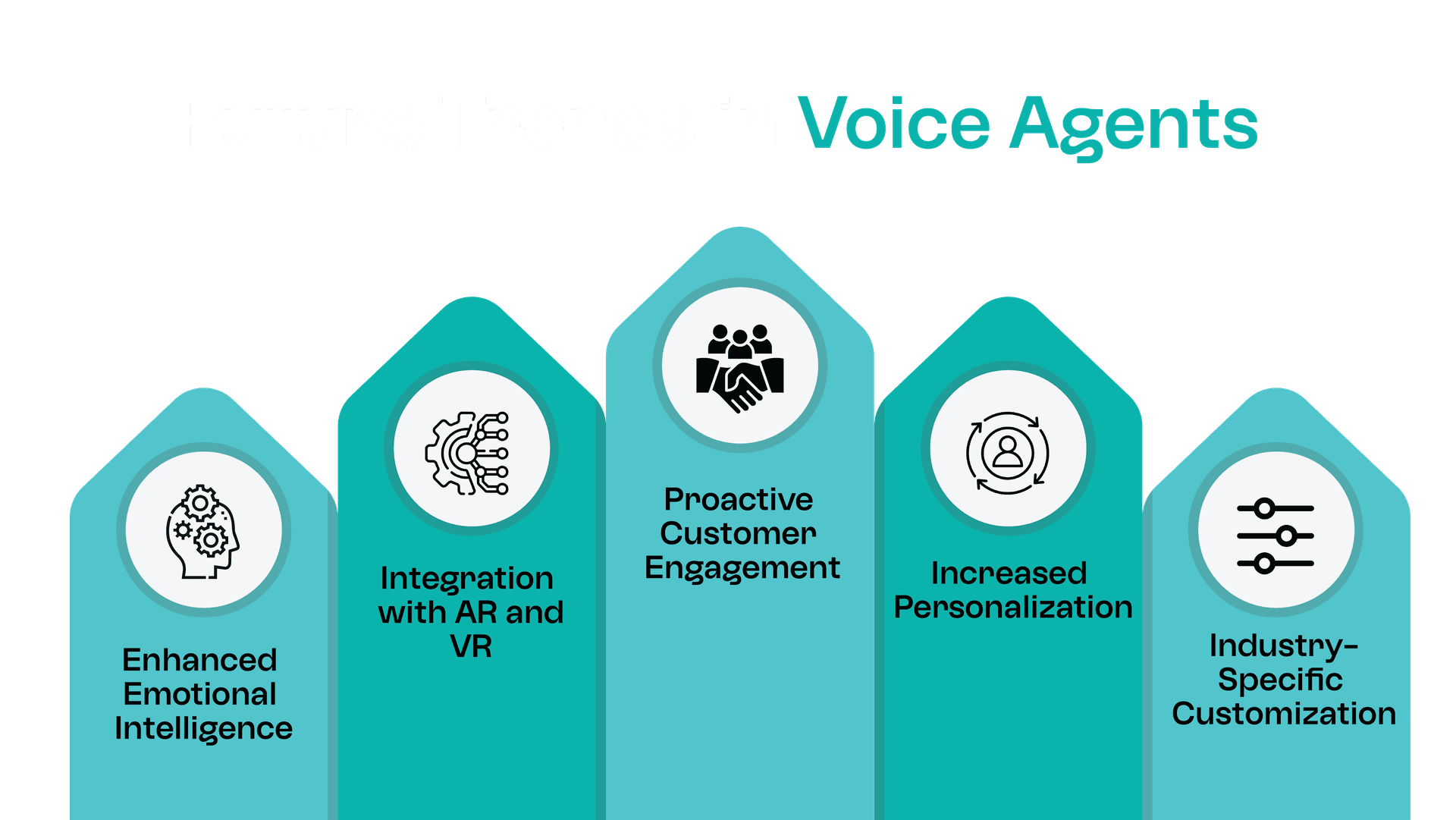How are voice agents breaking barriers for customer service?
We are at the center of a continuous shift in customer service. Imagine a world in which there are no time constraints and every customer inquiry is promptly and accurately answered. Research from MarketDigits indicates that the conversational AI industry is projected to reach $34.7 billion by 2030, demonstrating a significant increase in the adoption of AI for customer interactions.
As companies continue to expand their operations by leveraging AI to outperform the competition, customers require quick, consistent communication and solutions that cater to their specific needs.
AI voice agents are leading this change as tech innovators transform customer relations. This article will discuss AI voice assistants as the future of customer service and examine how companies currently interact with their customers.
What is a voice agent?
AI voice agents are advanced conversational tools designed to offer real-time customer support. These agents, in contrast to traditional automated systems, are experts at contextual awareness, meeting customer needs, and adapting human-like communication.
Not only can they respond to questions, but they can also interpret the meaning of the questions, adjust their responses dynamically, and even draw lessons from past experiences to improve performance in the future.
Key Characteristics for Customer Experience

1. Intelligence and Learning Capability
These voice agents utilize machine learning algorithms to continuously refine their responses and adapt to new scenarios to ensure consistent improvement with every interaction.
Suppose a customer asks questions frequently about product troubleshooting, and the agent can potentially offer options based on their past queries, thereby minimizing the overall resolution time.
2. Natural Language Processing
NLP allows voice agents to interpret language more precisely. Analyzing context, tone, and variations helps these bots understand regional dialects
For instance, if a customer asks about a product, the voice agent can correctly understand their request and offer an appropriate answer regardless of the customer’s language or cultural background.
3. Multitasking Efficiency
An AI voice agent shines when it comes to managing several tasks at once. They can handle inquiries, schedule appointments, process payments, and offer updates simultaneously.
Unlike human agents who get overwhelmed by various requests, these voice agents can handle simultaneous inquiries and provide real-time updates.
4. Emotion Recognition
Advanced AI voice agents come with sentiment analysis features, allowing them to understand the user’s emotional state and adjust their responses to fit the situation.
For instance, AI bots can be programmed to recognize the grievances of customers and then take the initiative to act in their best interests
5. Omnichannel Integration
These agents effortlessly blend with various communication channels, including email, chatbots, and social media platforms, to create a unified customer experience.
A voice agent mimics human interaction and harnesses AI’s incredible computational capabilities.
Top Use Cases in Customer Service
Through work automation and increased operational efficiency, these voice agents are revolutionizing customer service in many different sectors. According to Gartner, 80% of customer service and support organizations will be using generative AI technologies by 2025 to raise agent efficiency and improve the customer experience.
Check out these notable use cases:
1. Handling Frequently Asked Questions
AI voice agents offer timely answers to frequently asked queries concerning products and services.
2. Appointment Scheduling
AI voice agents handle appointment scheduling, cancellations, and rescheduling to simplify the experience for customers and service providers.
3. Technical Support
AI voice assistants help customers walk through the process of addressing technical problems, such as troubleshooting connectivity problems, guiding device setup, or resolving software errors.
4. Getting Feedback from Customers
AI voice agents can send surveys and gather comments from clients, providing insightful analysis of customer satisfaction.
5. Customized Suggestions
AI voice assistants can use customer data to offer recommendations for goods or services depending on customer preferences.
Challenges and Limitations of AI Voice Agents
As businesses and consumers increasingly rely on voice-activated technologies, it’s essential to understand the hidden challenges that come with implementing voice AI systems. Here are five crucial hurdles that often go unnoticed:
1. Automated Speech Recognition
One of the most significant challenges with voice AI is making sure that the ASR is performing well. Even the most advanced voice chatbots and conversational AI systems can struggle with understanding various accents, dialects, and speech impediments. Background noise, speech speed, and pronunciation variations can further complicate the process, leading to errors in interpreting user commands.
However, machine learning models can be trained with diverse datasets, improving the system’s ability to accurately interpret and respond to a wide range of speech patterns.
2. Contextual Understanding
Voice AI needs to comprehend not just the words but also the context in which they are used. Conversational AI systems often face difficulties in maintaining the context of a conversation, especially in longer interactions. This can result in irrelevant or incorrect responses, frustrating users and undermining the effectiveness of the voice chatbot.
3. NLP Limitations
NLP is at the heart of conversational AI, yet it has its limitations. Understanding nuances like sarcasm, humor, and idiomatic expressions is challenging for voice AI. These systems often struggle with complex sentence structures and multi-turn dialogues, leading to a less natural and more robotic interaction experience.
4. Data Privacy and Security
With the rise of voice AI, concerns around data privacy and security have intensified. Voice chatbots often process sensitive information, and ensuring this data is securely handled is paramount. Companies must navigate complex regulations and implement robust security measures to protect user data, which can be a daunting and costly challenge.
5. Integration with Existing Systems
Integrating voice AI with existing business systems, such as customer relationship management (CRM) software or enterprise resource planning (ERP) systems, can be complex. Ensuring seamless interaction between the voice chatbot and other platforms requires significant technical expertise and resources, which many organizations might lack.
Future Trends for Customer Experience

The rapid advancement of AI voice agent is exposing interesting new prospects when included in customer experience tactics. Consider the following trends influencing the direction of these tools in the future:
1. Enhanced Emotional Intelligence
AI voice agents are poised to grow from basic conversations to understanding and reacting to the emotional subtleties of a conversation. These agents will detect emotions, including frustration, satisfaction, or perplexity, using sentiment analysis and modern machine learning techniques.
Imagine a travel company’s voice AI agent that can sense the stress in a customer’s tone during a flight cancellation. It responds with reassurance, quickly presenting alternative solutions to ease the situation.
2. Integration with AR and VR
Combining AI voice agent with AR and VR technology can transform interactive client encounters. Voice agents will be virtual assistants guiding customers through engaging experiences in fields including retail, real estate, and gaming.
A real estate company could use AI voice agents during VR tours to respond to property inquiries and offer extra insights while customers navigate through virtual homes.
3. Proactive Customer Engagement
AI voice agent are evolving from merely responding to customers to actively engaging with them. With predictive analytics and customer data, they foresee needs and spark conversations before customers even identify a problem.
A telecom provider’s AI voice agent can alert customers when they exceed their data limit and recommend an appropriate upgrade plan to prevent service interruptions.
For example, In retail, they can notify customers about restocked favorite items or exclusive deals. Business can offer relevant, and personalized recommendations to improve engagement, strengthen loyalty, and enhance the overall customer experience.
4. Increased Personalization
Personalization is key in shaping customer experience strategies. Future AI voice agent will utilize customer data to create uniquely tailored experiences. In e-commerce, AI voice agents can provide personalized product recommendations and exclusive offers to improve retention.
These voice agents will keep learning from every interaction, begin to predict the customer’s needs, and deliver engaging experience across industries.
5. Industry-Specific Customization
AI voice agents will increasingly customize to meet the unique needs of diverse industries. For example in healthcare, they can help by scheduling appointments, providing general information about services, or answering frequently asked questions about billing.
A voice AI agent can provide patients with general information about prescriptions, such as usage instructions or potential side effects, or keep track of their doctor’s appointment schedules.
6. Ethical AI Practices
With the progression of AI technologies, there will be an increasing emphasis on sustainability and ethical practices in AI. AI voice agents will be crafted using energy-efficient models and clear algorithms to tackle worries about bias and environmental effects.
Basically, Google and Microsoft are working on AI models that consume less power and maintain high accuracy. Similarly, banks and financial institutions will utilize AI in voice agents to refrain from discriminatory lending decisions, such as analyzing search queries collected from customers without bias.
The Impact on the Future of Customer Experience

The future of customer service is all about seamlessly integrating AI voice agents into daily business operations. These intelligent agents are revolutionizing the way companies engage with their customers while establishing new standards for efficiency, personalization, and accessibility.
With the ongoing advancements in AI technology, voice agents will become increasingly intuitive, emotionally intelligent, and tailored to meet the distinct needs of every customer.
Are you prepared to take your customer service strategy to the next level? Impleko AI provides AI-driven solutions featuring voice agents designed to transform customer interactions.
